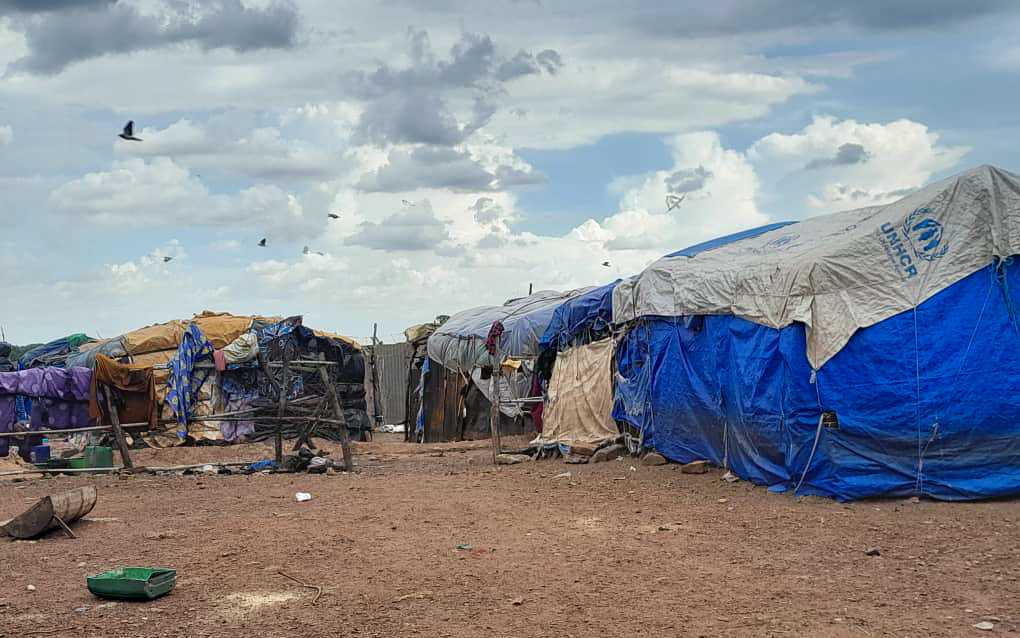At the Faladiè Garbal site, we encounter a poignant reality: internally displaced persons (IDPs) from Mali cohabit in an environment originally designated as a cattle market. “Galbal”, in Foulfouldé, “Grabal”, a name used in Bamanakan and “marché à bétail” (cattle market) in French, illustrates the bitter fusion between human life and the animal trade.
The security crisis in 2012 provoked a massive displacement of people from central Mali, Mopti, to other regions in Mali, and especially the district of Bamako. The Malian government recognizes several reception sites for IDPs, including Faladiè Garbal, Sogoniko, Cenou and Niamana. This study focuses on Faladiè Garbal, where the V4T Académie research unit conducted an in-depth survey in May 2023 to shed light on the realities of this site.
The living conditions of IDPs on the Faladiè site
The IDPs on the Faladiè Grabal site in Bamako face major challenges that exacerbate their situation of vulnerability, considerably affecting their economic, social and psychological conditions. These people live in an insalubrious environment, accentuated by the coexistence of a livestock market and mountains of garbage, resulting in exposure to various health risks. The lack of access to adequate sanitary facilities and drinking water worsen these conditions.
Safety is a constant concern, not least due to the lack of lighting and adequate surveillance. Women and girls are particularly at risk of violence. What’s more, the proximity of garbage mountains provides a haven for sex offenders, who take advantage of the darkness to assault women and girls using the toilet at night. The threat of rape adds a further layer of terror to their already precarious daily lives.
Food insecurity remains a daily struggle. Insufficient access to adequate food increases malnutrition and associated health problems. Furthermore, extreme poverty drives some women to resort to begging and prostitution as a means of survival, exposing them to increased risk of violence, exploitation and sexually transmitted diseases.
On-site accommodation
During our study we found that accommodation represents a major challenge for the occupants. They are forced to live in small, overcrowded tents, designed to accommodate between five and ten people. 35-year-old housewife from Mondoro Tolo A. testifies to these difficult conditions: “Sometimes two families share the same tent. This situation is very difficult for us. If we could find a solution to this problem, it would greatly improve our daily lives.”
Other ways of income: plastic waste collection and tontines
The women at the Faladiè Garbal site take responsibility for certain family expenses, living off waste collection with their children. These women manage expenses related to food, education and healthcare. Barry O., a displaced woman from Mondoro, tells us: “We came here two years ago. We start our days at 6 a.m.. We women and our children go out to collect cans and low-density scrap metal from the garbage. The sale of these materials can earn us between 1,000 and 1,500 CFA francs a day, which enables us to survive.” Some have received training in milk preservation and sorghum processing. However, despite support from the government and a number of NGOs, resources remain insufficient, forcing them to continue this precarious existence.
The survey showed that many of the internally displaced people on the Faladiè site were men who had lost their primary jobs on arrival in Bamako. Before their arrival, the men’s main occupations were livestock rearing, farming, fishing and trading. However, when they arrived, some of them changed professions directly, while others stayed in the same job, and some of them lost their jobs altogether. Diallo A., a 35-year-old trader from the Douentza region, confirms: “Before, when I was in my village of Boni, I used to farm and raise livestock, but I didn’t earn enough. However, my income here has not been better. Before I was with my family, I had money, but now I’ve lost everything, and I’m here just waiting for help from other people.”
To face part of the financial difficulties, Tontines have been set up by the community. Shareholders can receive an amount of 250f or 500f, respectively used for toilet maintenance and some minor site upkeep, and the larger amount for social cases, i.e. when a person is unable to meet his or her basic needs.
When will this misery end?
The plight of internally displaced people raises an urgent question: “When will this misery end?” The challenges faced by these individuals, including insalubrity, insecurity, hunger, and overcrowded accommodation, illustrate a daily struggle for survival. Faced with the loss of jobs and precarious living conditions, the residents are often pushed into dangerous, even degrading means of subsistence.
This alarming reality calls for concrete, coordinated and rapid action by the authorities, humanitarian organizations and the international community to develop sustainable solutions. These should not only meet immediate needs in terms of security and basic services, but also promote the economic and social integration of IDPs. Ending this misery depends on a firm commitment to improving living conditions and restoring dignity and hope among these vulnerable communities.





